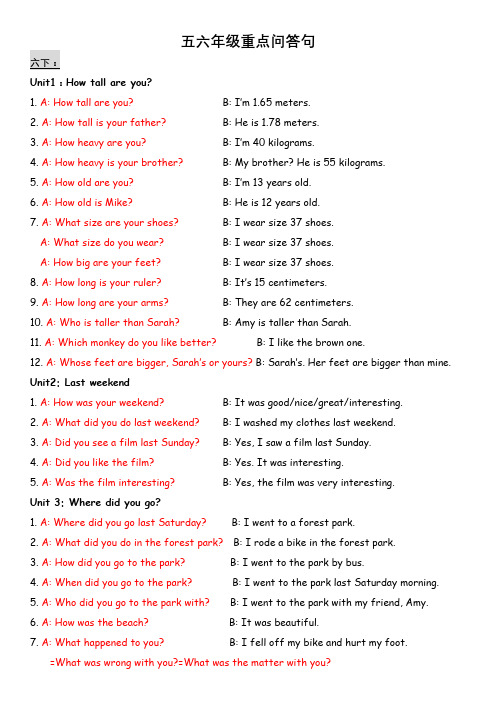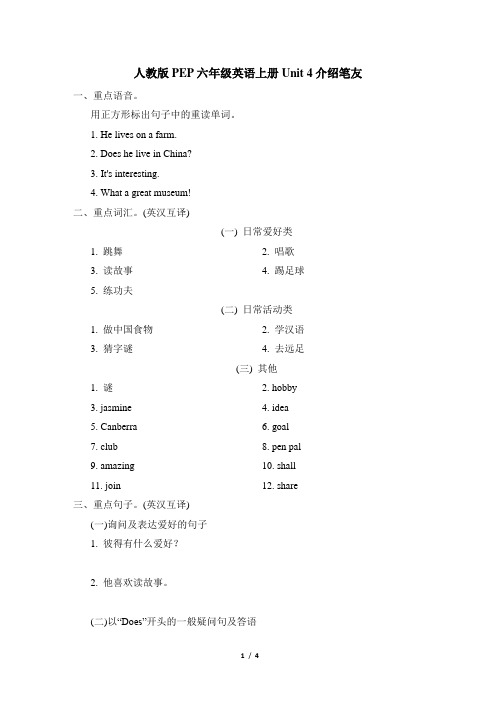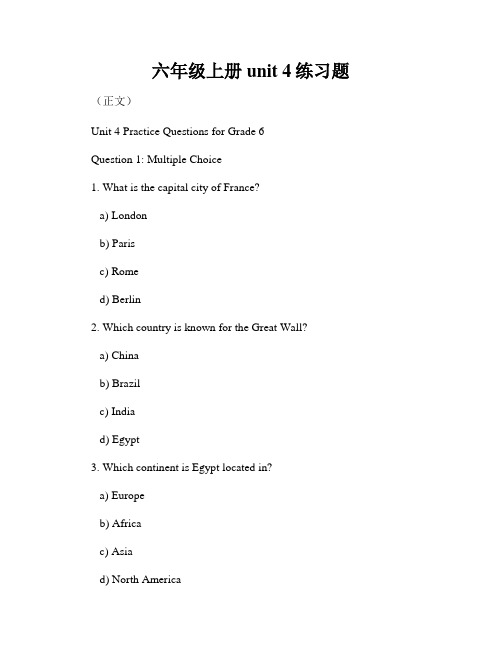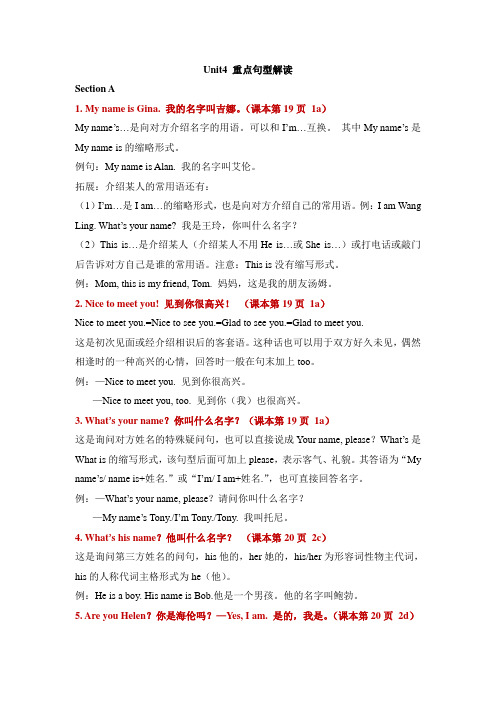六年级上册Unit 4 问答句
五六年级重点问答句

五六年级重点问答句Unit1:How tall are you?1. A: How tall are you? B: I’m 1.65 meters.2. A: How tall is your father?B: He is 1.78 meters.3. A: How heavy are you? B: I’m 40 kilograms.4. A: How heavy is your brother? B: My brother? He is 55 kilograms.5. A: How old are you?B: I’m 13 years old.6. A: How old is Mike? B: He is 12 years old.7. A: What size are your shoes?B: I wear size 37 shoes.A: What size do you wear?B: I wear size 37 shoes.A: How big are your feet?B: I wear size 37 shoes.8. A: How long is your ruler? B: It’s 15 centimeters.9. A: How long are your arms?B: They are 62 centimeters.10. A: Who is taller than Sarah? B: Amy is taller than Sarah.11. A: Which monkey do you like better?B: I like the brown one.12. A: Whose feet are bigger, Sarah’s or yours? B: Sarah’s. Her feet are bigger than mine. Unit2: Last weekend1. A: How was your weekend? B: It was good/nice/great/interesting.2. A: What did you do last weekend? B: I washed my clothes last weekend.3. A: Did you see a film last Sunday? B: Yes, I saw a film last Sunday.4. A: Did you like the film?B: Yes. It was interesting.5. A: Was the film interesting?B: Yes, the film was very interesting.Unit 3: Where did you go?1. A: Where did you go last Saturday? B: I went to a forest park.2. A: What did you do in the forest park?B: I rode a bike in the forest park.3. A: How did you go to the park? B: I went to the park by bus.4. A: When did you go to the park? B: I went to the park last Saturday morning.5. A: Who did you go to the park with? B: I went to the park with my friend, Amy.6. A: How was the beach? B: It was beautiful.7. A: What happened to you? B: I fell off my bike and hurt my foot.=What was wrong with you?=What was the matter with you?Unit4: Then and now1.A: What was your school like before?B: There was only a small building.= What was in your school?2. A: What is your school like now? B: There are many tall buildings.= What’s in your school?3. A: What was Mike like five years ago?B: He was short and quiet.4. A: What is Mike like now?B: He is tall and active.5. A: How did you change?B: Before I was quiet. Now I am very active.B: He couldn’t ride a bike before. But now he can ride it well.Unit1: How can I get there?1. A: Is there a cinema near here?B: Yes, there is. / No, there isn’t.2. A: How can I get there?B:Turn left at the bookstore, then go straight.3. A: Where is the post office? B: It’s next to the cinema.4. A: Can I go to the post office on foot?B: Sure, it’s not far.Unit2: Ways to go to school1. A: How do you come to school? B: I come to school by bike.2. A: How does Mike go to school? B: Usually he goes to school on foot.3. I go to school on foot. = I walk to school.I go to the USA by plane. = I fly to the USA.I go to the park by bike. = I ride a bike to the park.I go to the library by bus. = I take a bus to the library.I go to school by my mother’s car. = My mother drives me to school.4. A: What should I do at a yellow light? B: You should slow down and stop.5. A: What can I do at a green light? B: You can go at a green light.6. A: Do you go to school by subway?B: No, I go by school bus.7. A: Does Amy go to school by bus?B: No, she goes to school by bike.Unit 3: My weekend plan1. A: Where are you going tomorrow? B: I’m going to Guangzhou.2. A: How are you going to Guangzhou?B: I’m going to Guangzhou by car.3. A: Who are you going to Guangzhou with? B: I’m going to Guangzhou with my mom.4. A: What are you going to do in Guangzhou?B: I’m going shopping in Guangzhou.5. A: When are you going to Guangzhou? B: I’m going to Guangzhou this weekend.6. A: Are you going to play football tomorrow? B: No, I am going to see a film tomorrow. Unit 4: I have a pen pal1. A: What are your hobbies?B: My hobbies are singing and dancing.2. A: What is his hobby? B: His hobby is drawing pictures.3. A: What does she like?B: She likes reading stories.4. A: Where does he live?B: He lives in Canberra.5. A: Does he like doing word puzzles?B: Yes, he does.6. A: Is Amy’s hobby dancing?B: Yes, it is. / No, it isn’t.Unit 5: What does he do?1.A: What does he do?= What is he? B: He is a postman.2.A:Who is he?B: He is my uncle.3. A: Where does he work? B: He works in a post office.4. A: When does he go to work? B: He goes to work at 8:00.5. A: How does he go to work? B: He goes to work by car.6. A: What does he want to be? B: He wants to be a police officer.Unit 6: How do you feel?1. A: How do you feel?= How are you (feeling)? B: I am angry.=I feel angry.2. A: How does he feel? = How is he (feeling)? B: He is afraid.= He feels afraid.3. A: What’s wrong with you? B: I failed my English test. I am sad.4. A: What’s wrong with your father? B: He is ill. He should see a doctor.5. A: Why do you feel sad? =Why are you sad? B: Because my bike is broken.B: You should take a deep breath.Unit1: My day1. A: When do you do morning exercises?B: I do morning exercises at 7:00 a.m.2. A: What do you do on the weekend? B: I often play sports on the weekend.3. A: Why are you shopping today? B:My mum worked last night, so I'm shopping today.4. A: Do you often go for a walk on the weekend?B: No, but I often go swimming on the weekend.Unit2: My favourite season1. A: What’s the weather like in spring? B: It’s warm and sunny in spring.2. A: What’s spring like? B: It’s beautiful. There are colorful flowers everywhere.3. A: Which season do you like best? B: I like summer best.4. A: What's your favourite season?B: My favourite season is summer.5. A: Why do you like autumn? B: Because I can pick fruits.6. A: What do you often do in summer? B: I often go swimming in summer.7. A: What can you do in winter?B: I can make a snowman in winter.8. A: Do you like summer?B: No, it’s too hot.9. A: Is it cold in spring? B: No, it's warm in spring.Unit3: My school calendar1. A: When is the maths test? B: The maths test is in May.2. A: When is Tree-Planting Day?B: Tree Planting Day is in March.3. A: What will you do on Mid-Autumn Day? B: I will eat mooncakes .4. A: Is the school trip in April? B: Yes, the school trip is in April.5. A: Will you eat mooncakes on Mid-Autumn Day?B: Yes, I will eat mooncakes on Mid-Autumn Day.Unit 4: When is the art show?1. A: When is the Easter party? B: It's on April 21st.2. A: When is Grandpa's birthday? B: It's on October 12th.3. A: What will you do for your mum on her birthday? B: I'll cook noodles for her.4. A: What are the special days in April?B: April Fool's Day and Easter.5. A: When is China's National Day? B: It's on October 1st.6. A: What's the date today? B: It's October 1st.7. A: What day is it today?B: It's Monday.Unit 5: Whose dog is it?1. A: What’s this/that/it?B: It’s a dog.2. A: Whose dog is this/that/it? B: It’s my dog./It’s mine.3. A: What are these/those/they?B: They are dogs.4. A: Whose dogs are these/they/those? B: They are their dogs. / They're theirs.5. A: Are these pictures all ours? B: Yes, the pictures are all ours.6. A: Is the rabbit yours? B: Yes, the rabbit is mine.7. A: Where is Fido now? B: Fido is in the kitchen.8. A: Is Fido drinking water? B: Yes, Fido is drinking water.9. A: What is the dog doing? B: The dog is sleeping.10. A: Are the rabbits playing? B: Yes, the rabbits are playing.11. A: What are the animals doing? B: The animals are jumping.Unit 6: Work quietly1. A: What are you doing? B: I am doing kung fu.2. A: What is she doing? B: She is reading a book.3. A: What are they doing? B: They are listening to music.4. A: What should you do when your brother is sleeping?B: I should talk quietly.5. A: Are you reading a book? B: Yes, I am. / No, I am not.B: Yes, she is. / No, she isn’t.Unit 1: What's he like?1. A: Who is your art teacher? B: Mr. Jones is my art teacher.2. A: Who is Mr. Jones? B: Mr. Jones is our art teacher.3. A: What's your art teacher like?B: My art teacher is kind.4. A: What are they like? B: They are helpful.5. A: Is Mr Young funny? B: No, he isn't. He's strict.6. A: Do you know Ms Wang? B: Yes, she's my mother.Unit 2: My week1. A: What do you have on Mondays? B: I have maths, English and music on Mondays.2. A: What do you do on the weekend?B: I often play football on the weekend.3. A: What's that? B: It's a storybook.4. A: What day is it today/tomorrow? B: It's Friday.5. A: Is it Tuesday today? B: No, it’s Thursday.Unit 3: What would you like?1. A: What would you like (to eat)?B: I'd like a sandwich.2. A: What would you like (to drink)? B: I'd like some tea.4. A: What would Mike like ? B: Mike would like a hamburger.5. A: What do you have for dinner ?B: I have a cake and some soup for dinner.6. A: What’s your favourite food? B: My favourite food is pork(猪肉).7. A: What's his favourite drink? B: His favourite drink is milk .8. A: What’s her favourite fruit? B: Her favourite food is apples.9. A: What’s Amy’s favourite vegetable?B:Amy’s favourite vegetable is cucumber s.10. A:What's your mother's favourite food? B: My mother's favourite food is mutton.11. A: What do you like? B: I like beef. It's healthy.12. A: What's your favourite food? B: I like beef. It's healthy.13. A: What's for dinner?B: Fish sandwiches.14. A: Do you like hamburgers? B: Yes, I do. Hamburgers are delicious.15. A: Would you like some hamburgers? B: Yes, please. / No, thanks.16. A: May I have some rice?B: Sure. Here you are.17. A: Is your favourite food chicken? B: Yes, it is. It’s tasty.Unit 4: What can you do?1. A: What can you do for the party? B: I can draw cartoons.2. A: What can Sarah do? B: Sarah can play the pipa.3. A: What can Mike and Zhang Peng do? B: They can sing English songs.4. A: What can your sister do?B; My sister can dance very well.5. A: Who can dance for the party?B: Sarah. She can dance for the party.6. A: Who often dances on the weekend? B:Linda often dances on the weekend.7. A: Can you draw pictures well?B: Yes, I can. / No, I can’t.8. A: Can you Sing English songs, Amy? B: Yes, I can. / No, I can’t.9. A: Can Amy Sing English songs? B: Yes, she can. / No, she can’t.10. A: Can you Sing English songs, Amy and Sarah? B. Yes, we can. / No, we can’t.11. A: Can Amy and Sarah sing English songs?B: Yes, they can. / No, they can’t. Unit 5: There is a big bed1. A: What's in the living room? B: There is a sofa and a TV in the living room.2. A: What’s your living room like? B: It’s big and nice.3. A: Where is the photo? B: The photo is between the clock and the window.4. A: Where are the pictures? B: The pictures are above the TV.5. A: Is there any water in your water bottle?B: Yes, there is some water in my water bottle.6. A: Are there any storybooks in the shelf?B: No, but there are some science books in the shelf.Unit 6: In a nature park1. A: What's in the nature park? B: There is a mountain in the nature park.2. A: What's beside the forest?B: There is a river beside the forest.3. A: What's in the village?B: There are some houses in the village.4. A: Where is the lake? B: The lake is in front of the mountain.5. A: How many classrooms are there in your school?B: There are 60 classrooms in my school.6. A: How many bridges are there over the river?B: There are 3 bridges over the river.7. A: How many pencils can you see in the pencil-case.B: I can see 5 pencils in the pencil-case.8. A: How many birds do you see in the sky?B: I see 10 birds in the sky.9. A: How many books do you have in your bag?B: I have 3 books in my bag.。
六年级英语上册Unit 4 what’s your hobby?知识点汇总

六年级英语上册Unit 4 what’s your hobby?知识点汇总Unit 4 what’s your hobby?一、重点词汇:hobby爱好ride a bike骑自行车dive跳水play the violin拉小提琴make kites制作风筝collect stamps集邮live居住teaches教Watches观看goes去does doesn’t=does notcity 城市county 国家或者乡村province 省二、重点句型:.What’s your hobby?你的爱好是什么?2.I like collecting stamps. 我喜欢集邮。
3.He likes collecting stamps,too.他也喜欢集邮4.Does she teach English?No,she doesn’t. 她教英语吗?不。
5.Does she teach you math?Yes,she does.她教你数学吗?是的。
三、重点语法:、动词变为动名词的规则:动词变为动名词,即是动词加ing。
一般要遵循以下三条规则:()一般情况下,在动词的后面直接加ing。
如:playplaying readreading dodoing gogoing(2)以不发音的字母e结尾的动词,要去掉不发音的字母e,再加ing。
如:writewriting rideriding makemaking dancedancing(3)以单元音加单辅音结尾的重读闭音节,要双写最后一个辅音字母,再加ing。
如:runrunning swimswimming??? putputting sitsitting2、记住like后面要加动词ing,说爱好有三种说法:I like swimming.Swimming is my hobby.My hobby is swimming.注意:She likes drawing pictures, listening to music and making kites.这几个爱好是并列的,都是在like后面,所以都要加ing.3、第48页是写自己或者笔友的作文模板4、第49页是写自己或者是其他人一天的作文模板,记住要用一般现在时态。
人教版PEP六年级英语上册Unit 4 介绍笔友 附答案

人教版PEP六年级英语上册Unit 4介绍笔友一、重点语音。
用正方形标出句子中的重读单词。
1. He lives on a farm.2. Does he live in China?3. It's interesting.4. What a great museum!二、重点词汇。
(英汉互译)(一) 日常爱好类1. 跳舞________________________2. 唱歌_________________________3. 读故事______________________4. 踢足球_______________________5. 练功夫______________________(二) 日常活动类1. 做中国食物__________________2. 学汉语_______________________3. 猜字谜______________________4. 去远足_______________________(三) 其他1. 谜__________________________2. hobby_________________________3. jasmine______________________4. idea__________________________5. Canberra_____________________6. goal__________________________7. club_________________________ 8. pen pal________________________9. amazing______________________ 10. shall_________________________11. join_________________________ 12. share________________________三、重点句子。
鲁科版六年级上册英语unit4,重点句子

鲁科版六年级上册英语unit4,重点句子鲁科版六年级上册英语Unit4的主题是“喜好”,通过本单元的学习,学生们可以熟练运用以下重点句子进行交流。
首先,我们来解析一下这些句子的结构和含义。
句子1和2:“What do you like?”和“I like apples.”这是一组简单的问答句,用来了解对方的喜好。
例如,你可以问你的朋友:“你喜欢吃什么?”朋友回答:“我喜欢吃苹果。
”接下来是句子3和4:“Do you like oranges?”和“Yes, I do.”这是另一组问答句,用来询问对方是否喜欢某物。
例如,你可以问:“你喜欢橙子吗?”朋友回答:“是的,我喜欢。
”句子5和6:“What about you?”和“I like them too.”用于回应别人的提问,表示自己也喜欢同样的事物。
当你问朋友:“你喜欢苹果吗?”朋友回答:“你呢?”你回答:“我也喜欢。
”句子7至10:“How do you feel?”、“I feel happy.”、“Are you tired?”和“Yes, I am.”这些句子用来表达自己的感受。
例如,你可以问:“你感觉怎么样?”朋友回答:“我感觉开心。
”或者:“你累了吗?”朋友回答:“是的,我累了。
”在实际生活中,我们可以运用这些句子进行情景对话。
例如,你和同学在课间休息时,可以这样交流:你:“你喜欢吃什么?”同学:“我喜欢吃巧克力。
”你:“哦,我也喜欢吃巧克力。
你呢?”同学:“我也喜欢吃巧克力。
”此外,还可以通过这些句子来描述家庭成员的喜好。
例如,你可以说:“我妈妈喜欢逛街,我爸爸喜欢看电影,我喜欢玩游戏。
”总之,在学习Unit4的过程中,学生们不仅可以掌握这些实用的句子,还可以在日常生活中灵活运用,提高自己的英语表达能力。
人教版六年级英语上册Unit 4 第四单元知识总结

Unit4I have a pen pal一、核心词汇1. 名词: puzzle谜hiking远足2. 动词: studies(study的第三人称单数形式)学习二、了解词汇1. 名词: hobby业余爱好jasmine茉莉idea想法;主意Canberra 堪培拉(澳大利亚首都)goal射门club俱乐部2. 动词: shall表示征求意见join加入share分享3. 形容词: amazing令人惊奇的4. 短语: pen pal笔友三、核心句型1. — What are his hobbies?他有什么爱好?— He likes flying kites and singing English songs. 他喜欢放风筝和唱英文歌。
举一反三: What are your hobbies?你有什么爱好?What are her hobbies?她有什么爱好?拓展句型: — What is his/her hobby? 他/她有什么爱好?— He/She likes+动名词+其他. 他/她喜欢……拓展:动名词的构成方式(1)一般在动词后面加-inggo — going ask — asking do — doing(2)以不发音字母e 结尾的去e加-ingwrite — writing take — taking have — having(3)以重读闭音节结尾的词,末尾只有一个辅音字母,双写末尾辅音字母,再加-ing stop — stopping shop — shopping plan — planning2. — Does he live in Sydney?他住在悉尼吗?— No, he doesn’t. 不,他没有。
注意:在一般疑问句和否定句中动词第三人称单数要变回原形。
四、了解句型1. Why not? 为什么不能呢?解读: why not 后还可接动词原形,用来询问“为什么不……”, why don’t you也意为“为什么不”。
六年级上册unit 4练习题

六年级上册unit 4练习题(正文)Unit 4 Practice Questions for Grade 6Question 1: Multiple Choice1. What is the capital city of France?a) Londonb) Parisc) Romed) Berlin2. Which country is known for the Great Wall?a) Chinab) Brazilc) Indiad) Egypt3. Which continent is Egypt located in?a) Europeb) Africac) Asiad) North America4. What language do people speak in Japan?a) Mandarinb) Englishc) Japanesed) FrenchQuestion 2: Fill in the Blanks1. The ________________ Ocean is the largest ocean in the world.2. The highest mountain in the world is Mount ________________.3. The Great Barrier ________________ is located in Australia.4. The ________________ Canal connects the Atlantic and Pacific Oceans.Question 3: True or False1. The Statue of Liberty is located in London. ____________2. Brazil is the largest country in South America. ____________3. Sydney is the capital city of Australia. ____________4. The Amazon River is the longest river in the world. ____________Question 4: Short Answer1. Name one natural wonder of the world.2. What is the official language of Brazil?3. Name one country in Europe.4. What is the currency of Japan?5. Name one country in Asia.Question 5: Map SkillsStudy the map below and answer the following questions.[Map not provided. Please provide a detailed description of the map.]1. What is the capital city of China?2. What is the capital city of Brazil?3. Which continent is Australia located in?4. Name one country in Africa.5. Which country is located furthest south in South America?Question 6: Writing (100-150 words)Imagine you are taking a trip around the world. Write about three places you would like to visit and what you would like to see or do in each place.(Note: The format for this question should be in paragraph form, not an essay.)I hope these practice questions help you prepare for your Grade 6 unit 4 test. Good luck!。
鲁教版五四制英语六年级上册Unit4 重点句型解读

Unit4 重点句型解读Section A1. My name is Gina. 我的名字叫吉娜。
(课本第19页1a)My name’s…是向对方介绍名字的用语。
可以和I’m…互换。
其中My name’s是My name is的缩略形式。
例句:My name is Alan. 我的名字叫艾伦。
拓展:介绍某人的常用语还有:(1)I’m…是I am…的缩略形式,也是向对方介绍自己的常用语。
例:I am Wang Ling. What’s your name? 我是王玲,你叫什么名字?(2)This is…是介绍某人(介绍某人不用He is…或She is…)或打电话或敲门后告诉对方自己是谁的常用语。
注意:This is没有缩写形式。
例:Mom, this is my friend, Tom. 妈妈,这是我的朋友汤姆。
2. Nice to meet you! 见到你很高兴!(课本第19页1a)Nice to meet you.=Nice to see you.=Glad to see you.=Glad to meet you.这是初次见面或经介绍相识后的客套语。
这种话也可以用于双方好久未见,偶然相逢时的一种高兴的心情,回答时一般在句末加上too。
例:—Nice to meet you. 见到你很高兴。
—Nice to meet you, too. 见到你(我)也很高兴。
3. What’s your name?你叫什么名字?(课本第19页1a)这是询问对方姓名的特殊疑问句,也可以直接说成Your name, please?What’s是What is的缩写形式,该句型后面可加上please,表示客气、礼貌。
其答语为“My name’s/ name is+姓名.”或“I’m/ I am+姓名.”,也可直接回答名字。
例:—What’s your name, please?请问你叫什么名字?—My name’s Tony./I’m Tony./Tony. 我叫托尼。
【单元热难点】译林版(三起)英语六年级上册Unit 4 Then and now 语法重点(含解析)

【单元热点难点】译林版(三起)英语六年级上册Unit 4 Then and now 语法划重点1. 语法精讲一般过去时在前面的三个单元加上本单元,我们学习了一般过去时。
本单元重在复习一般疑问句,否定句和特殊疑问句。
肯定句结构:主语+动词的过去式+其他+表示过去的时间状语一般疑问句结构:Did+主语+动词原形+其他?回答:Yes,主语+did /No, 主语+didn’t 否定句结构:主语+didn’t+动词原形特殊疑问句结构:特殊疑问词+did+主语+其他?2.与一般过去时相关的时间状语yesterday, yesterday…, …ago, last…等。
3. 动词过去式的变化形式,尤其是到目前为止学生所学过的不规则动词的变化,要求学生能熟记。
小结如下:become – became, fly – flew, bring – brought, fly – flew, can – could, lose – lost, find – found, get – got, do – did, meet – met, hold – held, take – took, say – said, make – made, think – thought, write – wrote, eat – ate, come – came, do – did,go – went, see – saw, catch – caught, eat – ate, get – got, give – gave, have – had, wear – wore, meet – met, read – read, draw – drew, buy – bought, is – was, are—were,come – came, catch – caught, choose – chose, drink – drank, feel – felt, forget – forgot,grow – grew, know – knew, learn – learnt, let – let, put – put, run – ran, ride – rode,ring – rang, sing – sang, sit – sat, sleep – slept, speak – spoke, spend – spent,stand – stood, steal – stole, sweep – swept, swim – swam, teach – taught, tell – told 4. 情态动词can 的一般过去式为couldcould 是情态动词can的过去式,could的否定形式,即在could的后面直接加not,可缩写为couldn’t。
